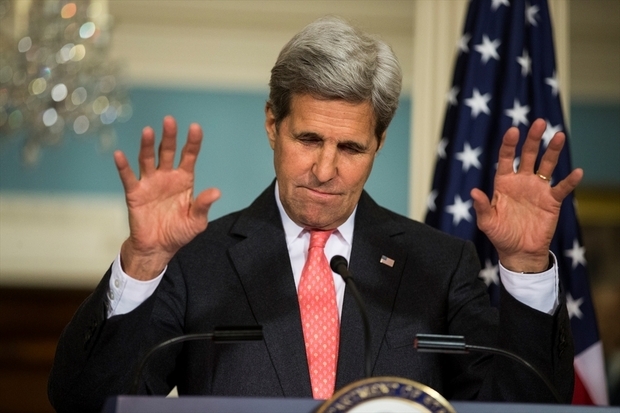Kerry and Abbas to discuss Israeli-Palestinian peace process

US Secretary of State John Kerry plans to meet Palestinian President Mahmoud Abbas in Paris on Saturday to discuss progress towards a two-state solution, the State Department said.
"The secretary is not looking at trying to make progress based on a fixed date on the calendar," spokesman John Kirby told reporters on Thursday.
Instead, Kerry will speak with "Abbas about prospects for a two-state solution, and trying to make meaningful progress to create the conditions ... where that solution can be more successfully pursued," Kirby said.
Kerry will travel to Paris late on Friday before returning on Sunday. He may also meet other leaders for bilateral discussions, although Kirby gave no further details on the matter.
"This is something he has been focused on since he has been the secretary of state, and will remain so for, I can assure you, the entire time that he's in office," Kirby said.
"You've seen the travel that he has made to the region. This remains an area of prime focus for him."
The Israeli-Palestinian peace process has been frozen for two years, with hopes that it could be revived before the end of President Barack Obama's administration now mostly dashed.
The Middle East diplomatic quartet - the European Union, Russia, the United Nations and the United States - urged Israel to stop building settlements and Palestinians to cease any incitements to violence in a July report that drew a frosty response from both sides.
Back in October, Kerry met with Abbas as part of an international diplomatic push to quell a wave of deadly Israeli-Palestinian violence.
"I'm hopeful. Let us have our meeting," Kerry told reporters.
Abbas for his part said: "All the time we have the hope. We did not lose the hope."
Violence has flared in the West Bank and the Gaza Strip recently as Palestinians have held large protests against the Israeli occupation.
Last year, violence erupted over the status of the historic Al-Aqsa Mosque, which is a sacred place to both Jews and Muslims and has long been a crucible for tensions fuelling the decades-old conflict.
Tensions over the mosque compound, in addition to the daily pressures and restrictions faced by Palestinians as a result of occupation, have fueled a wave of knife attacks, shootings and car-rammings against Israelis, as well as clashes between Palestinians and Israeli security forces and attacks by Jewish settlers on Palestinians.
Some 36 Israelis and 223 Palestinians, many of them attackers, have been killed in the violence since October.
Stay informed with MEE's newsletters
Sign up to get the latest alerts, insights and analysis, starting with Turkey Unpacked
Middle East Eye delivers independent and unrivalled coverage and analysis of the Middle East, North Africa and beyond. To learn more about republishing this content and the associated fees, please fill out this form. More about MEE can be found here.




